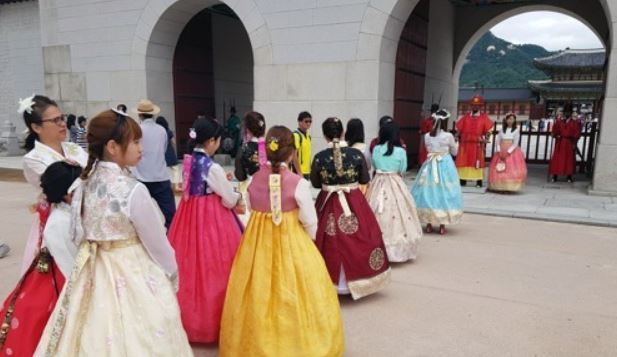China’s leading online travel agency is reviewing the resumption of sales of Korea-bound tour programs, industry sources said Thursday, in a sign that the ongoing diplomatic row over Seoul‘s deployment of a US anti-missile system here may be calming.
Ctrip.com International has recently told Lotte Hotel & Resorts, the hotel arm of South Korea’s fifth-largest conglomerate, Lotte, that it is reviewing the resumption of Seoul-bound tours, according to the sources.
“Until now, finding travel packages bound to South Korea, including hotels and such, was impossible through the site,” a Lotte official said.

A group of foreign tourists wearing traditional Korean costumes wait in line to take photos with palace guards in front of the main gate of Gyeongbok Palace in Seoul on Aug. 17, 2017.
Since mid-March, the Beijing government has banned its travel agencies from selling tour programs bound to South Korea following Seoul‘s decision to deploy the Terminal High Altitude Area Defense system on its soil.
Last month, the number of Chinese tourists in South Korea declined 56 percent on-year, marking the seventh straight month of falling figures. Chinese nationals accounted for nearly half of all tourists who visited South Korea in 2016.
The latest move came as Beijing wrapped up its weeklong 19th National Congress on Tuesday, in which President Xi Jinping cemented his power upon entering his second five-year term.
Industry watchers say Beijing’s economic retaliation over the THAAD installation, which has wreaked havoc on South Korean companies, especially those in the tourism and retail sectors, could be finally coming to an end.
Lotte was among those most hurt, as it signed a land-swap deal with the Seoul government to host the THAAD system.
The conglomerate recently decided to pull its discount store business out of the Chinese market, after 87 out of 99, or 87.9 percent, of its stores in China suspended operations since early this year. (Yonhap)




![[KH Explains] No more 'Michael' at Kakao Games](http://res.heraldm.com/phpwas/restmb_idxmake.php?idx=645&simg=/content/image/2024/04/28/20240428050183_0.jpg&u=20240428180321)

